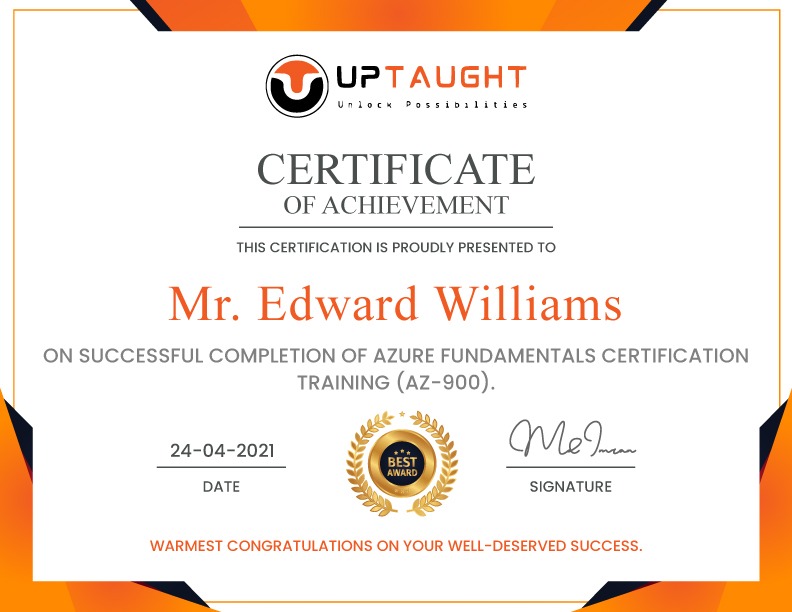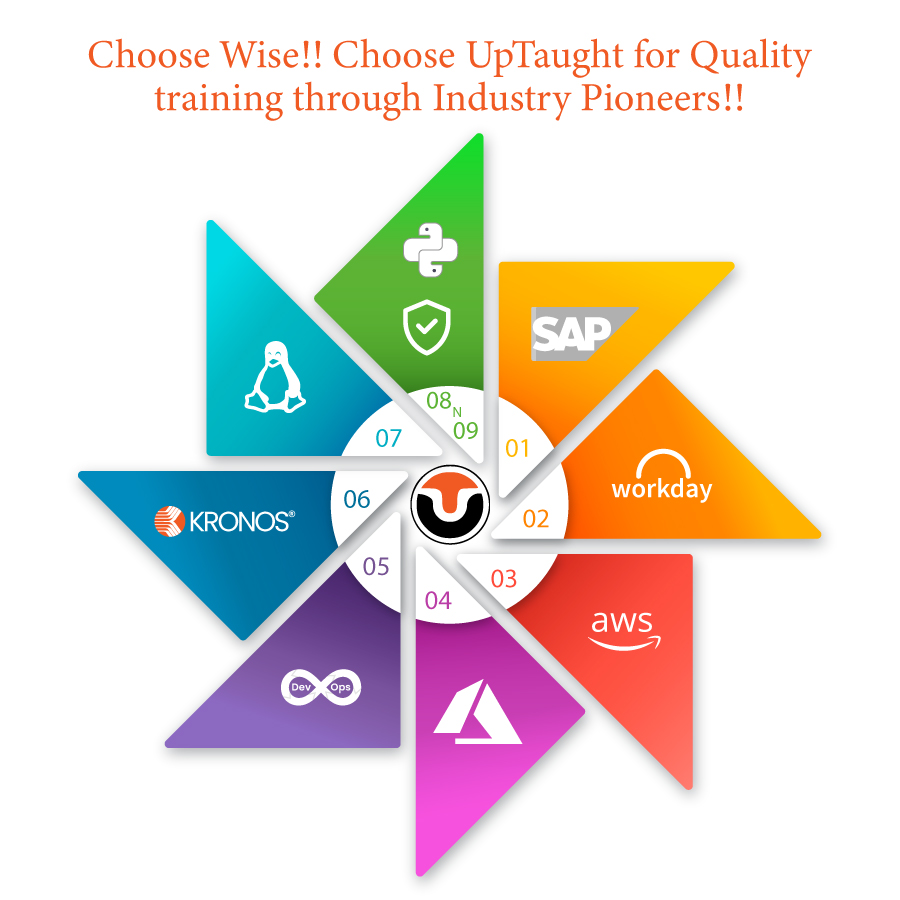Azure Fundamentals Certification Training (AZ-900)
Fundamentals of Microsoft Azure Training and Certification
UpTaught’s Microsoft Azure’s Fundamental Training Certification Program aims in giving the learners the complete package of Azure infrastructure by understanding cloud solutions, processing workloads and security, creating and deploying apps and securing data in Azure.
-
LevelAll Levels
Start Date
Time
Duration
Type
Mode of Training
Course Curriculum
Module 1 – Azure Fundamentals
-
1. Introduction to AZ – 900 for 2021
Module 2 – Cloud Concepts
-
1. What is Cloud Computing?
-
2. Overview of Azure Cloud Services
-
3. Advantages of Cloud Computing
-
4. Infrastructure-as-a-Service (IaaS), Platform-as-a-Service (PaaS) and Software-as-a-Service (SaaS)
-
5. Public, Private, and Hybrid cloud models
-
6. The Language of Cloud Computing
-
7. The Economy of Cloud Computing
-
8. Azure Marketplace
-
9. Understand terms such as High Availability, Scalability, Elasticity, Agility, Fault Tolerance, and Disaster Recovery
-
10. Capex vs Opex
Module 3 – Understand Core Azure Services
-
1. Core Azure architectural components
-
2. Core resources available in Azure
-
3. Core Azure Services and Products
-
4. Azure Solutions
-
5. Azure management tools
-
6. Azure Resource Manager
-
7. Azure regions
-
8. Regions and Availability Zones in Azure
-
9. Azure Availability Zones
-
10. What is Azure Resource Manager?
-
11. Generate resource groups and resources at the subscription level
Module 4 – Compute
-
1. Introduction
-
2. Azure Virtual Machines
-
3. VM Availability
-
4. Availability Zones
-
5. App Services
-
6. Containers
-
7. Serverless Computing
-
8. Deploying Your First Azure Virtual Machine
-
9. Comparing Compute Options
Module 5 – Networking
-
1. Networking Overview
-
2. Hybrid Connectivity
-
3. Load Balancers
-
4. Content Delivery Network
Module 6 – Data and Storage Services
-
1. Types of Data
-
2. Azure SQL
-
3. Cosmos DB
-
4. Azure Storage
-
5. VM Disk Storage
-
6. Storage Account via Azure Portal
Module 7 – Other Service
-
1. IoT Services
-
2. Big Data Services
-
3. Machine Learning
-
4. AI Solutions
-
5. Azure Functions
-
6. Azure Logic Apps
-
7. Azure DevOps Solutions
Module 8 – Accounts and identity
-
1. Overview of Azure Authentication
-
2. Accounts and Subscriptions Overview
-
3. Domain Services
-
4. Azure AD
-
5. RBAC
-
6. Azure Policy
-
7. Resource Locks
-
8. Azure Blueprints
-
9. Cloud Adoption Framework ( CAF )
Module 9 – Security, Privacy, Compliance, and Trust
-
1. Secure network connectivity
-
2. Core Azure identity services
-
3. Security tools and features
-
4. Azure governance methodologies
-
5. Monitoring and reporting
-
6. Privacy, compliance, and data protection standards
Module 10 – Azure Pricing and Assistance
-
1. Azure subscriptions
-
2. Planning and managing costs
-
3. Azure support options
-
4. Azure Pricing Calculator
-
5. Azure Cost Management
-
6. Azure Service Level Agreements (SLAs)
Module 11 – The Azure Service Lifecycle
-
1. Overview
-
2. Public and Private Preview Features
-
3. Accessing Preview Features
-
4. General Availability
-
5. Monitoring Feature Updates
Azure Fundamentals Certification Training (AZ-900)
-
LevelAll Levels

Roadmap
Salary range
FAQs
At first glance, the AZ-900 exam appears to be one of the easiest IT certifications on the market, but that doesn’t mean it isn’t challenging.
There are a ton of resources to help with your exam preparation. UpTaught has a guided course that helps you with all the necessary skills to ace the exam.
If you don’t have a Computer degree and want to start a career in Cloud computing, the Azure Fundamentals certification is for you. Azure is one of the cloud computing services platforms that has optimized the needs of the industry and is the trend and need of the next decade from today.
As per the latest Microsoft Azure update, candidates can now take the Microsoft Azure exams online, due to the COVID-19 situation. We have also received many queries from the candidates on how to take the Microsoft Azure exam online, especially the Freshers targeting the AZ 900 exam.
For someone early in their tech career, the Azure Fundamentals certification can be part of what lifts them from a less technical role into a more technical role.
The average salary for Azure skills is $96,000 as per compensation data firm PayScale.
Here are some of the jobs you could expect to get after passing the Azure Fundamentals certification exam.
- Azure Cloud Solutions Architect
- Cloud Engineer
- Cloud Administrator
- Azure Cloud Systems Developer
- Azure IaaS Architect
- Azure Virtualization Engineer
- Azure IoT Expert, and
- Full Stack Cloud Developer for Azure
The Microsoft Azure Fundamentals exam tests your understanding of four main areas:
- Knowledge of Cloud Concepts
- Knowledge of Core Azure Services
- Knowledge of Security, Privacy, Compliance, and Trust, and
- Knowledge of Azure Pricing and Support
The certification exam costs $165 USD.
Microsoft is the second-biggest cloud provider in the market. It was launched in 2012 and has been emerging at an unprecedented rate since then. According to a study by Forbes, Microsoft Azure revenue developed 50% year-over-year in fiscal Q2, 2021. Cloud technology has taken the IT world by storm. More than 70% of the IT companies utilize the Cloud in one form or another, and this is going to enhance in the upcoming years. Hence, there is going to be a crucial shortage for Cloud professionals in the coming years. So gear up, and be ready!
You are allowed to take Azure cloud certification exam only for 5 times in a year. After exceeding the limit of 5 attempts, you can retake only after the completion of 12 months from the date of exhaustion of 5th attempt.
Microsoft certifications are structured into four levels:
- Fundamentals
- Associate
- Expert
- Specialty
As per the Global Knowledge reports, the Azure Fundamentals certification helped people earn an average salary of $126,653 in 2020.
If you want to ace Azure Certification and to develop applications in Azure, you require knowledge of:
- Open-source frameworks like ASP.NET
- Programming languages like SQL Server, HTML5 and JavaScript
Also, you must possess knowledge of handling Microsoft tools like Office 365 and PowerShell that will assists you comprehend how these services integrate with Azure.
The passing score required to clear the exams is 700.





